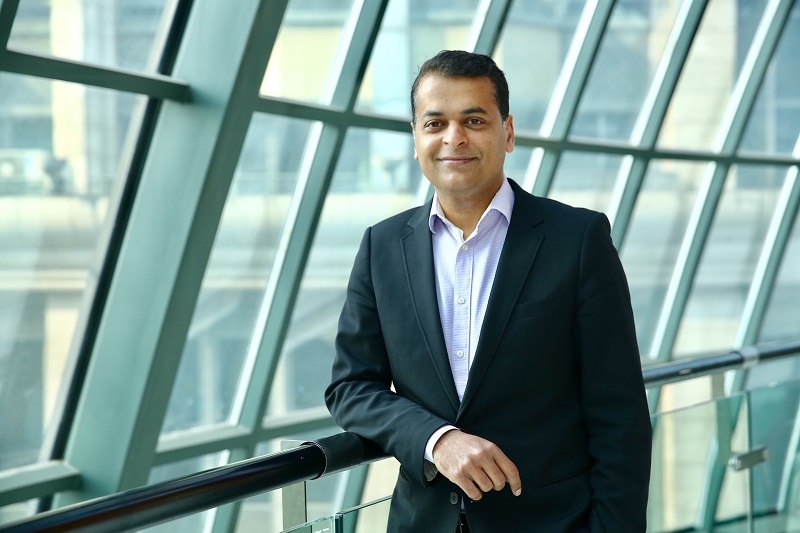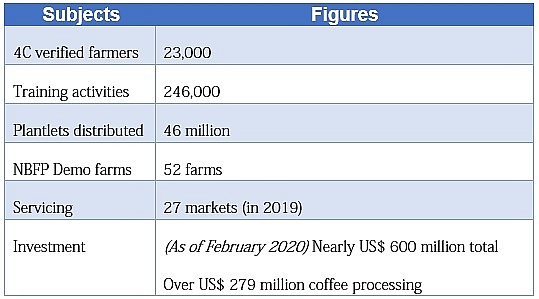Giving farmers tools to rise to sustainability
 |
| Binu Jacob, CEO of Nestlé Vietnam |
What is the contribution of the NESCAFÉ Plan to the sustainable development of Vietnam’s coffee sector?
Despite being the world’s largest Robusta coffee nation, Vietnamese coffee is facing several problems that cast adverse impacts on the segment’s long-term development. The quality of Vietnamese coffee is still limited as most coffee farmers plant and harvest by following traditional methods without the application of modern science and technology. Also, ageing coffee areas have also affected coffee quality and output.
Nestlé launched the global NESCAFÉ Plan in 2010. The programme aims at creating shared value in the coffee sectors for coffee farmers, communities, and the planet while at the same time ensuring our continuous support for responsible and sustainable value chains. The NESCAFÉ Plan was launched in key growing coffee areas of continents such as America, Africa, and Asia. We are very proud that together with Brazil, NESCAFÉ Plan Vietnam is the largest-scale project globally.
In Vietnam, NESCAFÉ Plan has been active since 2011. Working with the Western Highland Agriculture and Forestry Science Institute (WASI), Nestlé Vietnam has provided strong support to coffee farmers in the Central Highland provinces of Lam Dong, Dak Lak, Dak Nong, and Gia Lai, achieving outstanding results in terms of improved practices (following the 4C verification scheme) improved green coffee quality and improved farm income with more environmentally sustainable farming practices and inputs. Up to now, more than 21,000 farmer households have received the internationally recognised 4C certification with the support from our agronomists.
The Nescafe Plan in Vietnam has empowered local farmers with the goal of supporting them to become “agripreneurs”. With a team of 10 Nestlé agronomists, we have conducted 230,000 training lessons on the best farming practices and equipped farmers with useful techniques to improve the output, bean quality, and sustainable farming practices. We have also more than 274 farmer group leaders who help farmers exchange experiences among each other and with our agronomists.
In the last 10 years, through the NESCAFÉ Plan, we have distributed 46 million high-yielding and disease-resistant coffee plantlets to coffee farmers in five provinces of the Central Highlands. Working with WASI, we have supported the government programme to rejuvenate 46,000 hectares of aged coffee areas.
How does the NESCAFÉ Plan help improve the lives of Vietnamese coffee farmers?
As I mentioned earlier, the issues that can affect the medium-term success of coffee growing in Vietnam include the age of the coffee trees. More than 30 per cent of the country’s coffee trees are 20-30 years old, and the present high productivity may decline over time if they are not rejuvenated.
By rejuvenating the coffee farms with high-yielding, disease- and drought-resistant varieties, we have helped to increase the coffee productivity and to improve the coffee economics for farmers.
Through the adoption of sustainable farming practices, coffee farmers have saved costs by reducing 40 per cent water for irrigation and 20 per cent chemical fertilisers and pesticides while increasing their incomes by 30-100 per cent by using intercropping models.
Since last year, our agronomists have assisted farmers to manage their farms with the FARMS advanced software. This is a mobile application managing the data of each farm and connecting farmers with experts to get assistance in a timely manner. The software also creates a database of the best farming practices so that farmers can learn and apply them directly on their coffee farms.
How important is Nestlé’s collaboration with other stakeholders to ensure sustainability and competitiveness of Vietnamese coffee?
“Creating Shared Value” is fundamental to how we do business at Nestlé. We believe that our company can only be successful in the long term by creating value both for our shareholders and for society. Companies that create shared value demonstrate that business can be a force for good.
To develop sustainably and to be more competitive, we strongly believe that all concerned stakeholders must work closely together. That’s the reason why we have actively worked with the Ministry of Agriculture and Rural Development (MARD), the Western Highlands Agriculture & Forestry Science Institute, and provincial Agricultural Extension Centers in the Central Highlands since 2010. Nescafé Plan in Vietnam is considered a successful public-private partnership in the coffee industry.
All Nescafé products produced in Vietnam are sourced from the Central Highlands. The high quality of Nescafé products made in Vietnam have also convinced international consumers in more than 25 countries and regions and in Asia, Europe, America, and Oceania with notoriously high-quality, strict compliance markets like Japan, South Korea, the United States, and the European Union.
Vietnam aims to increase its coffee export turnover to $6 billion by 2030 while maintaining its position as the world’s second-largest coffee producer and exporter. What is the role and strategy of Nestlé Vietnam to help Vietnam achieve the targets?
While Vietnam is the second-biggest coffee producer in the world and the biggest in Robusta, Nestlé is the biggest buyer of coffee in Vietnam with approximately 20 per cent of the total output. Every year, Nestlé injects $600-700 million into the rural economy through coffee purchasing.
To add more value for Vietnamese coffee, we have been continuously increasing the volume of processed coffee for domestic demand and export. At Nestlé Tri An Factory in Dong Nai province, we produce decaffeinated coffee, soluble coffee, and coffee capsules branded Nescafé Dolce Gusto of which recent reformulated capsules with Vietnamese coffee such as Americano Rich Aroma, Espresso Intenso, and American earned enormous praises from strict markets like Japan, resulting in us producing these goods at 100 per cent capacity every month.
In strict markets such as the EU, various authorities have set limits of maximum residue levels for glyphosate herbicide in different commodities. Therefore, we continue to work with farmers and other stakeholders on improving and monitoring agricultural practices and reducing pesticides and herbicide where possible. This is to ensure that no potential compliance issues related to responsible sourcing arise.
Bringing new product choices to young and demanding local consumers is another priority by Nescafé. This year alone, we have introduced new Nescafé Cà Phê Việt soluble products and some other new coffee products that meet the needs of young Vietnamese consumers.
 |
| Key NESCAFE Plan Figures |
NESCAFÉ Plan has played a crucial role in public-private partnership in Vietnam’s coffee sector. What are some highlights of the Nescafé Plan in the last 10 years?
Co-chaired by Nestlé Vietnam and the MARD’s Department of Crop Production, the PPP Coffee Task Force has 22 partners, including global roasters, coffee traders, input companies, certification organisations, development partners, financial institutions, and government organisations. On a pre-competitive platform, partners of the PPP coffee task force invest along the value chain to improve coffee quality, coffee sustainability, and farmer income (see graphic).
Nestlé Vietnam was recognised by the MARD for its important role in the development of the Vietnamese coffee industry. We were presented with the Certificate of Merit for our outstanding contributions to the Vietnam’s coffee industry and sustainable agricultural development under the PPP model.
What the stars mean:
★ Poor ★ ★ Promising ★★★ Good ★★★★ Very good ★★★★★ Exceptional
Related Contents
Latest News
More News
- Middle East tensions set to test VN-Index, boost energy stocks (March 02, 2026 | 17:15)
- Agency of Foreign Trade warns of trade disruption due to Middle East conflict (March 02, 2026 | 17:11)
- Spring Fair 2026 boosts domestic demand (March 02, 2026 | 16:30)
- Law on Investment takes effect (March 02, 2026 | 16:21)
- Ho Chi Minh City attracts nearly $980 million in FDI in early 2026 (March 02, 2026 | 10:57)
- Academic-policy network planned to support VIFC development (February 28, 2026 | 08:00)
- Businesses bouncing back after turbulent year (February 27, 2026 | 16:42)
- VinaCapital launches Vietnam's first two strategic-beta ETFs (February 26, 2026 | 09:00)
- PM sets five key tasks to accelerate sci-tech development (February 26, 2026 | 08:00)
- PM outlines new tasks for healthcare sector (February 25, 2026 | 16:00)

 Tag:
Tag:




















 Mobile Version
Mobile Version